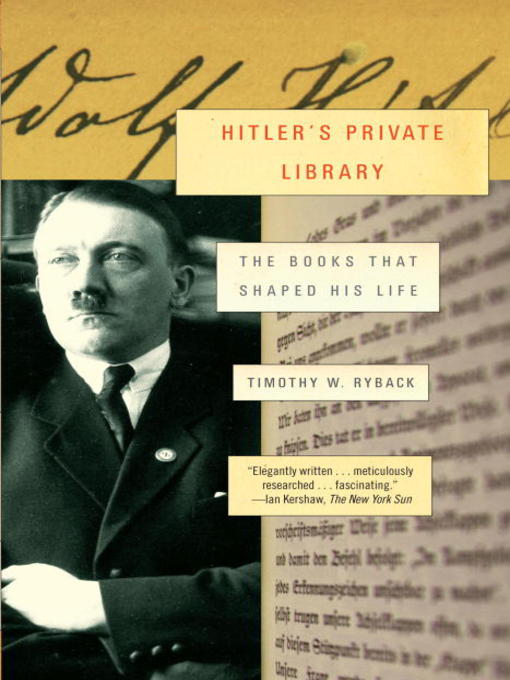
Hitler's Private Library
The Books That Shaped His Life
کتاب های مرتبط
- اطلاعات
- نقد و بررسی
- دیدگاه کاربران
نقد و بررسی

August 18, 2008
Hitler's personal library of over 16,000 volumes was picked clean by American troops. But Ryback found 1,200 of Hitler's volumes in the Library of Congress and other caches scattered through the U.S. and Europe. By looking at the books Hitler read (sometimes obsessively, judging from marginalia and other signs of wear and tear), Ryback paints an unusually vivid and nuanced portrait of the dictator. Among the authors and works Hitler was most interested in were Shakespeare (in translation), whose grand historical subjects, Hitler felt, made him superior to Schiller and Goethe; Henry Ford's anti-Semitic The International Jew
; adventure novelist Karl May; Dietrich Eckart's interpretation of Ibsen's Peer Gynt
; works of the occult and esoterica; and Thomas Carlyle, particularly his biography of Frederick the Great. Ryback (The Last Survivor: Legacies of Dachau
) offers a unique view of Hitler's intellectual life. 47 photos.

Starred review from October 15, 2008
One can probably deduce from a private book collection aspects of its owner's worldview, formative influences, interests, and preferences. The known remnants of Adolf Hitler's personal library, consisting of 1200 volumes, were uncovered recently in the rare books storage of the Library of Congress by Ryback (cofounder & codirector, Inst. for Historical Justice and Reconciliation, Austria; "The Last Survivor"). Through examining the more significant titles and analyzing notations and marginalia, Ryback traces a path of thoughts that occupied Hitler throughout his career and the key phrases borrowed from his reading that he incorporated into his writing, public words, and actions. The book collection reflects Hitler's deep but erratic interest in religion and theology, a fascination with magic and the occult, a curious attention to a particular interpretation of Henrik Ibsen's epic poem "Peer Gynt", and an admiration for "Don Quixote, Robinson Crusoe", the works of Shakespeare, and Henry Ford's "The International Jew." Ryback's audacious and original exploration adds valuable context and another way to try to fathom, as he writes, "one of most impenetrable personalities of modern history." Recommended particularly for academic libraries and history collections as well as larger public libraries. [See Prepub Alert, "LJ" 6/1/08.]Ali Houissa, Cornell Univ., Ithaca, NY
Copyright 2008 Library Journal, LLC Used with permission.

September 15, 2008
Hitler wasnt particularly well educated, and he despised the impotent flabbiness of intellectuals. Yet he was a voracious reader, and his various personal libraries contained more than 6,000 volumes at his death. Ryback found several hundred of these volumes stored in the Library of Congress. On the assumption that Hitlers tastes in reading will be revelatory, Ryback examines some of these works, with Hitlers handwritten notations found in the margins, and he speculates about the effects these readings had upon Hitlers views. Some of Hitlers tastes were generally known, such as his love for cheap American western novels, which seemed to appeal both to his romantic fantasies and his obsession with the struggle between civilization and barbarism. He also liked Shakespeare, particularly The Merchant of Venice, with its caricature of the greedy Jew. Predictably, Hitler also read such nineteenth-century proto Nazi writers as Paul La Garde, who demanded the elimination of Jewish influence in Germany. Ryback doesnt conclusively demonstrate how these writers shaped Hitlers beliefs; still, this is an interesting glimpse at an often-neglected facet of Hitlers personality.(Reprinted with permission of Booklist, copyright 2008, American Library Association.)

























دیدگاه کاربران